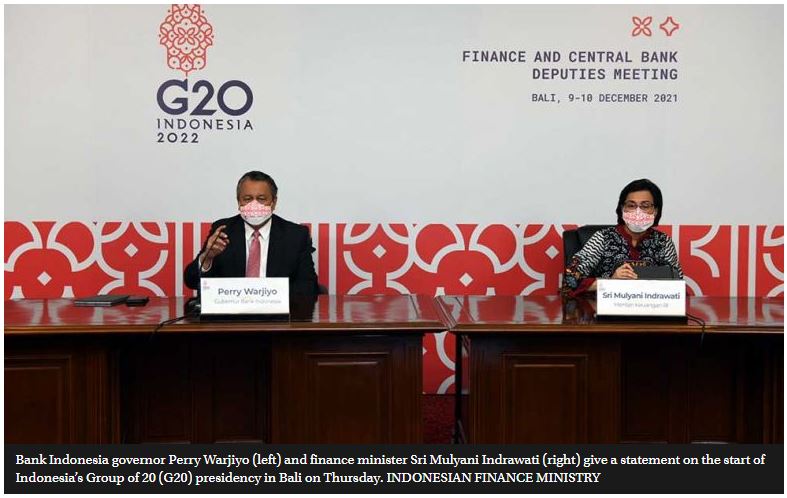Indonesia rallies G20 to tackle tough tax issues
Indonesia is seeking to rally the Group of 20 (G20) nations to reach agreements on four intractable global taxation issues, hoping to clinch certain deals before the country’s G20 presidency ends in December of next year.
Indonesia will raise the issues of the taxation of multinational companies’ profits, a 15 per cent global minimum corporate tax, environmental taxation and gender-conscious taxation over the course of its one-year presidency of the body, which started on December 1.
Wempi Saputra, an adviser on macroeconomics and international finance for the finance minister, told reporters on December 10 that G20 nations had agreed to speed up deal making on the first two issues, discussions of which had started last year under the presidency of Italy.
The latter two issues had been proposed by Indonesia, but delegates had only warmed up to the gender taxation issue, he said, whereas discussions on environmental taxation had not shared the same success.
“For countries doing the deliberation, this is still a dynamic issue,” he said.
Indonesia expected the G20 to sign a convention on the taxation of multinational corporations’ profits by mid-2022, followed by ratifications in each member country. Under such an agreement, multinationals could be required to pay taxes on profits in countries where their goods and services are sold and not just those in which they officially operate.
“The discussion [of multinational taxation] was quite progressive, and all delegates welcomed the immediate signing of the convention,” Wempi said.
On the minimum corporate tax rate, deliberations are still underway, and the agreement’s framework has not been finalised, but Indonesia expects the G20 to “reach some agreements” by the end of its presidency, Wempi said, so countries could end the “race to the bottom” in global tax rates.
Indonesia proposed a global agreement on environmental taxation that it hoped could be adopted by non-G20 nations as well.
Little was shared about this proposal, but Wempi said it would revolve around carbon taxes, which have been outlined in Indonesia under the newly passed Harmonised Tax Law (HPP).
On gender-based taxation, Indonesia aims to offer a wide range of tax facilities for women entering the labour market, such incentives for maternity leave. Deliberations are still in the working group stage.
“The Organisation for Economic Cooperation and Development [OECD] proposed that, and we want it to be a real achievement of Indonesia’s presidency, regarding gender-based taxation,” Wempi said, promising more updates in February 2022, during the G20 finance ministers and central bank governors (FMCG) meeting.
Finance minister Sri Mulyani Indrawati on December 9 said reaching agreements on these four global tax issues would benefit many countries, particularly in restoring fiscal balances during the ongoing pandemic recovery period.
Indonesia itself has made efforts to reinstate a budget deficit cap of three per cent of gross domestic product (GDP) by 2023, including by passing the HPP law, which aims to boost tax collection.
“We want to have the guiding principle on the international tax system to be fair, simple, equitable taxation for both developed and developing countries,” she said.
Centre for Indonesia Taxation Analysis research manager Fajry Akbar on December 13 said the multinational profit tax deal would help, in particular, to tackle the taxation problem with tech firms, which he said were operating and gaining income from many countries without properly complying with local tax policies.
In Indonesia, the government has started collecting value-added tax (VAT) on the goods and services tech companies sell in the country, but it does not collect income taxes, which are currently taken by the company’s country of origin.
“So this would definitely help with our taxation, including many other countries,” said Fajry.
Meanwhile, a global minimum tax would help reduce the number of companies shifting their profits across borders to exploit lower tax rates, which has deprived many big economies, including Indonesia’s, of considerable tax revenue.
A study published in missingprofits.world estimated that Indonesia lost $2.47 billion in state revenue as companies shifted more than $9.88 billion worth of profits to tax havens in 2018.
Esther Sri Astuti, programme director at the Institute for Development of Economics and Finance (Indef), said gender-conscious taxation could help reduce gender disparities in the labour market, including the generally lower salaries women received and the fewer career opportunities afforded to them.
She said such taxation policies would motivate more women to join the workforce and would thereby increase household income and consumption, driving economic growth. Lowering women’s income taxes was an example of such a policy.
“This is the global trend. Therefore, it is necessary to continue to encourage the participation of women in the labour market,” she said.
Esther went on to say that having a global agreement on environmental taxes, particularly a carbon tax, would help reduce the chances of capital flight from high-emissions companies and industries.
However, with many delegates not too keen on the discussions, she suggested Indonesia prepare upcoming carbon tax and carbon market-related regulations accordingly, following the passage of the HPP Law.
THE JAKARTA POST/ASIA NEWS NETWORK


 Thailand
Thailand




